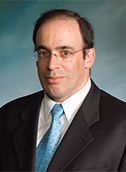
Ronald Levy, MD, DABAProfessor
Anesthesiology
Secondary Department: Neuroscience and Cell Biology
Dr. Levy has been involved in simulation since 2001 when he was asked to plan, design, budget and eventually be the Director of the Patient Simulation Center. We offer courses in Crisis Resource Management, Difficult Airway management as well as basic airway management for other hospital departments. We are also heavily involved with the medical school and have done interprofessional work with our respiratory therapy and nursing colleagues. He has served as a section chair for the International Meeting on Medical Simulation (IMSH) in 2011, and as co-chair for the meeting in 2012. He also has served on their Board of Directors. He has served for the past 5 years on the Simulation Editorial Board for the American Society of Anesthesiologists (ASA) and as the Associate Editor-in-Chief for the Interactive Computer Based Education Editorial Board of the ASA. In 2016, Dr. Levy was selected as an inaugural fellow of the Society for Simulation in Healthcare Academy.
He was promoted to Professor in 2008 and granted tenure in 2015. He was in the inaugural class of the AMT in 2007, received the UT Distinguished Teaching Professor in 2008, inducted into UT Academy of Health Science Educators in 2010 and holder of the Susan Brown Logan Endowed Professorship of the AMT from 2015-2017. Dr. Levy was the recipient of the Regent’s Outstanding Teacher award in 2017.
From a research perspective, he is interested in looking at medical errors, correlating learning styles to simulation training and best practices for teaching machine troubleshooting.
Learner Types: JSSOM - Medical Students - Pre-Clerkship, JSSOM - Medical Students - Clinical Years, JSSOM - Residency/Fellowships.
Assessment of Learners: Debriefing Techniques, Clinical Skills Assessment, Test-Writing, Test-Analysis, Feedback to Learners.
Advancement/Promotion: Peer Observation of Teaching, CV Development, Educator Portfolio.
Curriculum: Curriculum Design.
Educational Leadership: Leadership Development.
Instructional Methods: Audience Response Systems, Clinical Teaching (Hospital or Clinic), Experiential Learning, Flipped Classroom, Games for Teaching, Interactive Teaching - Large Group, Interactive Teaching - Small Group, Simulation-based Education, Problem-based Learning (PBL).
Scholarship - Ed Research or Curriculum Innovation: Grant-Writing, Presentation Skills.
Special Content: Faculty Development - Teaching Skills, Faculty Development - Technology-related, Learners as Teachers, Procedural Skills.